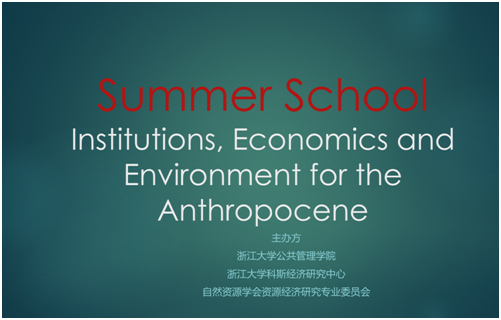
【课程介绍】
“人类世”时期的资源使用、人口增长和环境压力是一个相互联系且复杂的系统。在这种系统视角下,人类该如何反思自身的价值观、制度设计、经济发展和环境保护行为?人类已经面临因改变自然而带来的巨大生存威胁——如果人类能够及时认识到自然的脆弱性并及时采取行动,或许还能抓住重启与自然共处的机会。本课程的目的就是在新时代背景下讨论人类社会的复杂性,通过制度设计塑造价值追求、提高人类集体行动能力,从而重新实现人类与自然界的健康稳定发展。
The course is about institutions, economics and environment in the current epoch of the Anthropocene. It will explain how to rethink human values, institutions, economics and the environment in an epoch which is characterized by increasing resource use, populations, environmental pressures, interconnectedness and complexity. In that new historical context humans on earth are facing their greatest challenges and existential threats from how they have transformed nature, but also opportunities for renewal and stewardship of spaceship earth, recognizing the vulnerability of human and non-human life. In that new historical context, the challenge is to scale up social complexity and enhance collective intelligence by transforming the emerging values into institutions, and governance for the collective public good of planetary health.
【课程目标】
1、了解复杂性理论、协同进化、尺度等基本概念,并将其应用于人类发展领域。
2、了解人类历史的重要历史背景——它是如何出现的,发生了什么,以及其对气候变化和地球健康的影响?
3、能够基于复杂性理论和不同经济思想流派解释财富的创造。
4、批判地反思社会进步与发展,相关的措施和指标。能够讨论超级社会可能面临的威胁和机遇。
5、理解制度与治理结构的概念,以及在复杂情况下它们如何演化。区分制度变迁理论,解释制度失灵,系统风险治理以及可持续性转型。
6、能够识别和描述不同的治理类型和制度,理解集体的理性与智慧。
7、熟悉合作系统的建模。
1. To understand basic concepts of complexity theory, coevolution, scale and be able to apply them to human development.
2. To understand the big historical context of the Anthropocene, how it has emerged, what happened during the great acceleration and what the implications are for climate change and planetary health.
3. Ability to explain wealth creation from the perspective of complexity theory and from different schools of economic thought
4. Critically reflect progress and development, its measures and indicators and able to discuss the threats and opportunities of ultrasociality
5. Firm knowledge of what institutions and governance structures are and how they evolve in the context of complexity; ability to differentiate theories of institutional change, explain institutional failure, governance of systemic risks and transformations to sustainability
6. Be able to identify and describe different governance types and resource regimes, the role of communicative rationality and collective intelligence
7. Familiar with collaborative systems modelling
【课题主讲专家介绍】
Prof. Franz W. Gatzweiler

Franz W. Gatzweiler博士自2015年以来任职于中国科学院城市环境研究所,并担任国际科学理事会全球跨学科科学计划——“Urban Health and Wellbeing: a Systems Approach”的执行主任。他毕业于波恩大学和德国柏林洪堡大学的农业经济学方向。博士论文的研究关注自然的经济价值和经济价值的本质。曾获德国和国际主要研究基金会的资助,研究撒哈拉以南非洲和南亚的森林景观、生物多样性、贫困和边缘化治理问题。 他还是美国印第安纳大学Ostrom Workshop的客座教授。Franz W. Gatzweiler博士目前的研究方向为复杂系统的治理和系统性风险。
Dr. Franz W. Gatzweiler is professor at the Institute of Urban Environment, Chinese Academy of Sciences and Executive Director of the International Science Council’s global interdisciplinary science programme on “Urban Health and Wellbeing: a Systems Approach” since 2015. He studied Agricultural Economics at the University of Bonn and the Humboldt University of Berlin in Germany. His doctorate research was on the ‘Economic Value of Nature and the Nature of Economic Value’. He received grants from major German and International foundations for research on managing forest landscapes, biodiversity, poverty and marginality in Subsaharan Africa and South Asia. He is external affiliated faculty of the Ostrom Workshop and received the ‘habilitation’ from Humboldt-University in the field of resource economics 2015. His current research interests include the governance of complex systems and systemic risks.
【课程对象和时间安排】
欢迎全校对于课程感兴趣的研究生、高年级本科生等按照下文报名方式进行预报名,并对相应的排课安排进行选择。也欢迎愿意参与课程互动、讨论和未来合作研究的教师们报名参加。预报名截止时间为2021年4月18日,课程时间确定后,将在公众号正式发文开启报名。
课程结束后,全程参与且通过考核的学生将授予课程证书。
【报名方式】
点击下方链接填写问卷。
https://www.wjx.cn/vj/rel4QLh.aspx

